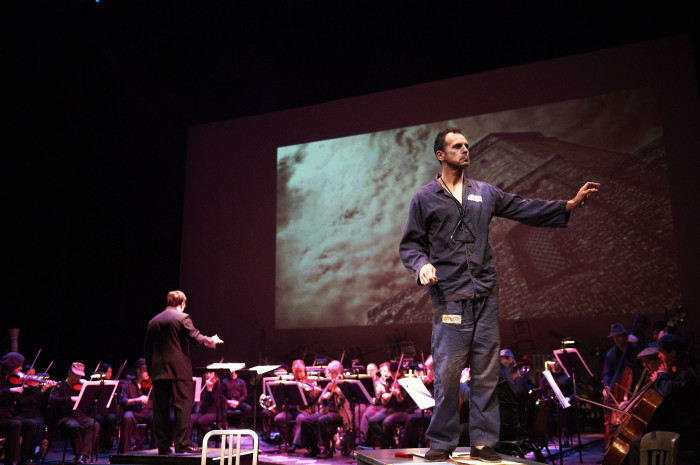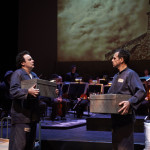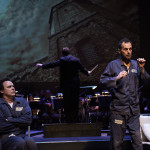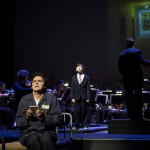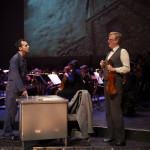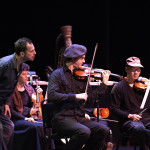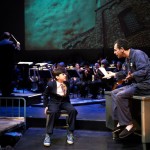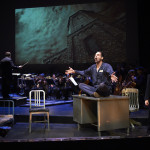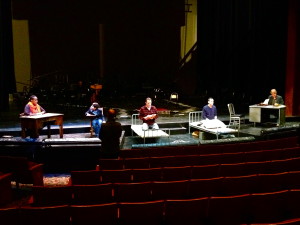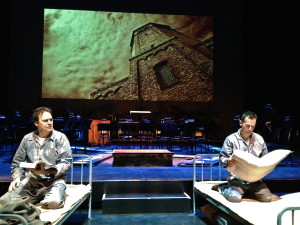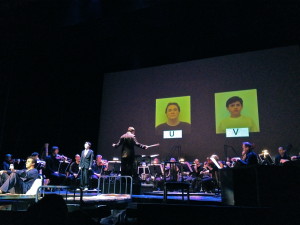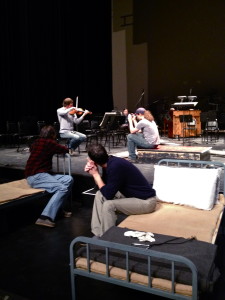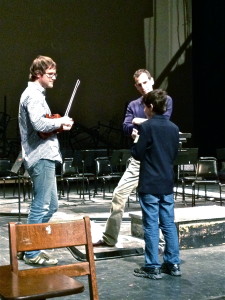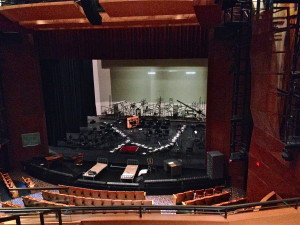Photos by Roger Mastroianni
Excerpts from the reviews
Full reviews are below
“A work that remains uncomfortably relevant . . . As the delusional conductor, the gaunt T. Ryder Smith is terrific, his eyes gleaming with unhinged delight when “the organ grinder’s timpani” finally gets it right. And, as Alexander, unjustly imprisoned for speaking his mind, Charles Kartali hits all the right notes — he sticks to his guns without being preachy.” Andrea Simakis, Cleveland Plain Dealer
“A unique and provocative work . . . a strongly effective production. . . . T. Ryder Smith captured the lunatic comedic essence of Ivanov, at one point leaping off the stage and conducting the audience as if they were his imaginary orchestra.” Timothy Robson, ClevelandClassical.com
“The orchestra is about as engaged and expressive as can be, countering the string of insults heaped upon it by Alexander Ivanov, the triangle-playing mental patient who suffers vivid delusions of musical grandeur. . . . And who knew an orchestra could be so funny? Feddeck and crew seem only too happy to epitomize conformity and stuffiness, gamely playing off the conventions of classical music. . . . “Every Good Boy” would have been a treat by itself. But the orchestra and Feddeck offer one savory bit more in the form of a prelude: Arvo Part’s “Cantus in Memory of Benjamin Britten.” Zachary Lewis, The Cleveland Plain Dealer
Rehearsals
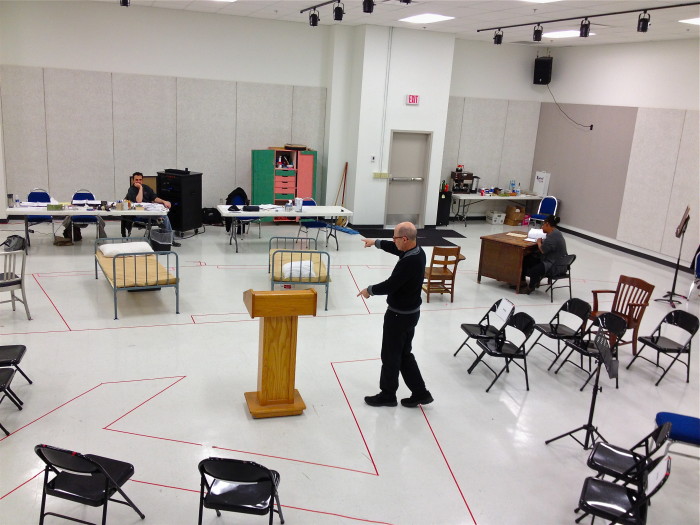
Publicity
http://www.examiner.com/article/the-cleveland-orchestra-and-cleveland-play-house-partner-for-egbdf
Offstage
Above, listening to Peter Otto play; chatting with Peter Otto and Ryan Vincent; with Ryan Vincent; the set.
Full reviews
Cleveland Plain Dealer. Clevealnd.com, Andrea Simakis – ‘Every Good Boy Deserves Favor’ is a powerful collaboration between actors and Cleveland Orchestra. Leave it to Tom Stoppard to wring comedy out of a soul-chilling tragedy: the Soviet practice of treating political dissidents as though they were mad and burying them in asylums with the truly deranged.
The story behind “Every Good Boy Deserves Favor,” his audacious 1977 collaboration with composer Andre Previn, concerns two patients, both named Alexander Ivanov, who share a “ward” in a prison of a mental hospital. (The use of the word “cell,” a doctor explains, is verboten, to uphold the illusion that the gulaglike accommodations are actually palliative).
One of the men (we’ll call him Ivanov) is really sick, as evidenced by his belief that he “has an orchestra,” a group of musicians only he can hear. He even conducts the players and sometimes accompanies them, pinging a triangle he wears around his neck.
The other inmate (Alexander, to keep everybody straight) has been thrown into the snake pit for daring to point out that writers like himself are being institutionalized to shut them up.
“I have no symptoms; I have opinions,” he tells his doctor.
“You’re disease is dissent,” the doctor answers.
A government man through and through, the physician gives Alexander a helpful prescription for freedom: accept a diagnosis of “paranoid schizophrenia” and applaud the state for its excellent care.
“I was never mad, and my treatment was barbaric,” Alexander answers.
“Stupidity is something I can’t cure,” the doctor quips.
First staged in London in the 2,900-seat Royal Festival Hall, the piece starred Ian McKellen and the late John Wood as the unfortunate inmates and Patrick Stewart as the unctuous M.D. They were backed by the London Symphony Orchestra, conducted by Previn.
That grand spectacle — Those actors! That sound! — must’ve been something to see. But those ghosts don’t haunt this production, a spectacular, chamber-orchestra version scaled down to fit the intimacy of the Allen Theatre.
Director Michael Bloom smartly situates the musicians on stage, his actors and their mean, iron beds directly in front of the orchestra, successfully integrating music and drama. (The men sometimes even mince among the strings and woodwinds). Had he crowded the players to the side or marginalized the actors on the other, the two would have made a bad marriage, the spouses bickering and estranged. Here, they are one beautifully complementary pair, making the persistent aural hallucinations of Ivanov seem to really be coming from his head.
As the delusional conductor, the gaunt T. Ryder Smith is terrific, his eyes gleaming with unhinged delight when “the organ grinder’s timpani” finally gets it right. And, as Alexander, unjustly imprisoned for speaking his mind, Charles Kartali hits all the right notes — he sticks to his guns without being preachy. (Alexander’s speech about being tortured, bound foot-to-wrist in what amounts to a stress position, hits close to home).
And hats off to Stoppard for writing a work that remains so uncomfortably relevant. Thirty-five years after its premiere, journalists and protesters alike are being imprisoned for their opinions in Syria and other corrupt regimes.
It’s so awful funny I could cry. 5.4.12
Cleveland Classical.com, Timothy Robson – Every Good Boy Deserves Favor. As part of its first New Ground Theatre Festival, the Cleveland Play House is collaborating with The Cleveland Orchestra on Every Good Boy Deserves Favor, by Tom Stoppard with an elaborate musical score by composer/conductor André Previn. The first of three performances occurred on Thursday, May 3, and it continues on Friday and Saturday, May 4-5, at the imaginatively renovated Allen Theatre in Playhouse Square in downtown Cleveland. The play was directed by Play House artistic director Michael Bloom, and a large contingent of The Cleveland Orchestra was conducted by the orchestra’s assistant conductor, James Feddeck.
Every Good Boy Deserves Favor was first performed in 1977 as part of the festivities celebrating Queen Elizabeth II’s Silver Jubilee, with a starry cast including Ian McKellan, John Wood, Patrick Stewart, and André Previn conducting the London Symphony Orchestra. Because of the unusual requirement of a full symphony orchestra (here somewhat reduced in size), the work has been rarely performed, with no readily available audio or video recordings. The work’s title is a mnemonic device used by beginning music students to remember the lines of the treble clef, EGBDF. That musical motif occurs throughout the play in various guises, and is the last musical thing we hear at the end of the play.
The plot of Every Good Boy Deserves Favor revolves around two Soviet mental hospital cell-mates, both named Alexander Ivanov. One (referred to as Ivanov) suffers from hallucinations in which he plays the triangle in an orchestra that he controls but is audible only in his own mind. The second patient (known as Alexander) is a political dissident imprisoned in the mental hospital. The play is a one-hour fantasia in several short scenes of musico-verbal wordplay intertwined with a scathing indictment of the Soviet practice of sending inconvenient political prisoners not to prison but to mental hospitals where they might be released if they agree to lie about allegedly “successful treatment” and recant their former dissident ideas.
The patients are “treated” by a “Doctor” who is not a medical doctor but a doctor of semantics. The Doctor, a ridiculous comic character, tries to convince Ivanov that there is no orchestra; he tries to convince Alexander that he can be released from the hospital if he compromises his political ideals and admits that he was insane and that he has been “cured.” To confuse things further, the Doctor plays violin in an orchestra. Alexander’s elementary-age son Sacha is also seen in a classroom where the Teacher tries to get him to comply with Soviet classroom requirements. When Alexander begins a hunger strike, Sacha is sent to try to convince his father to recant and be released. The fate of the two men is ultimately decided by a deus ex machina Colonel (presented here perched high atop a tall rolling platform bathed in blood-red light).
The action takes place mostly at the front of the stage, with the hospital cell at center, with the Teacher’s classroom at the left from the audience’s view and the Doctor’s office at the right. The orchestra was placed behind the action, although at various times Ivanov and others move around within the orchestra. The set consisted of a few simple pieces of furniture at the front, a large white screen at the back of the stage onto which atmospheric images of institutional brick towers and prison cells were projected. At the end of the play a chilling montage of photographs of political prisoners identified earlier in the play only as A, B, C, D, etc. is projected. In front of the screen was a pile of discarded 1950s-vintage institutional office furniture junk. The orchestra members wore basic black, adorned with various hats, jackets and shawls. The principal characters were in costume: hospital tunics and pants for the prisoners; a button down shirt, bow tie and sweater for the Doctor; a school uniform for the son; and a severely tailored suit for the Teacher.
The cast was strong: T. Ryder Smith captured the lunatic comedic essence of Ivanov, at one point leaping off the stage and conducting the audience as if they were his imaginary orchestra. Charles Kartali was a tormented Alexander, who could be released from his hospital jail with only one lie. Ryan Vincent was winning as the young son Sacha; Lisa Louise Langford was a chillingly efficient Teacher. The Doctor, who at times seemed as insane as the patients he was responsible for, was played to the hilt by Matthew Wright. Pete Ferry made an impressive Colonel in his brief but pivotal appearance.
André Previn is a highly respected conductor of symphonic works and the composer of two well-received operas, but earlier in his career he was active as a composer and arranger of film music and as a jazz performer. That experience shows in Every Good Boy Deserves Favor. Much of the music is in the style of Prokofiev and Shostakovich and, like good movie music, is at the service of the text. Although the music is in places difficult, with exposed passages for soloists, it is not memorable on its own, but serves Stoppard’s text and action, although more directly than in the simple underscoring of a motion picture. The individual scenes of the play are connected by elaborate musical interludes. One never had the sense that conductor Feddeck and the members of The Cleveland Orchestra were slumming; they performed Previn’s music with the skill that we expect from that ensemble.
Every Good Boy Deserves Favor is a unique and provocative work, with its intricately and inextricably linked music and words. The words become contrapuntal in their repetition and development of musical themes and political ideas. The music serves to amplify what is going on in the characters’ minds as well as their physical actions. The Cleveland Orchestra and Cleveland Play House have given Stoppard’s words and Previn’s music a strongly effective production. 5.4.12
Cleveland Plain Dealer, Zachary Lewis – Cleveland Orchestra musicians are utterly engaging in ‘Every Good Boy Deserves Favor’ theatrical turn. The Cleveland Orchestra spends much of “Every Good Boy Deserves Favor” making no sound. Nonetheless, it’s an integral, vibrant part of the show.
Deftly led by conductor James Feddeck, the group, pared down from the full ensemble, utters not a single word but still manages to speak volumes about the characters, their world and what’s taking place on stage in the Cleveland Play House’s New Ground Theatre Festival production.
Don’t expect stellar acoustics. Allen Theatre is no Severance Hall. Yet within that environment, otherwise ideal for the play, the orchestra is about as engaged and expressive as can be, countering the string of insults heaped upon it by Alexander Ivanov, the triangle-playing mental patient who suffers vivid delusions of musical grandeur.
Playing Andre Previn’s score and seated right on stage amid the actors, the orchestra escapes any fate as mere prop or accompanist to convey the grinding loneliness of the two Ivanovs and the rigidity of the Soviet system.
Instantly at home in music redolent of Shostakovich, the group supplies concentrated doses of the dread, bleakness and sheer insanity so crucial to the tale. The final scene with Col. Rozinsky — whose name bears a striking resemblance to that of the Cleveland Orchestra’s second music director — is terrifying largely because the musicians make it so.
And who knew an orchestra could be so funny? Feddeck and crew seem only too happy to epitomize conformity and stuffiness, gamely playing off the conventions of classical music.
Moreover, there’s a message behind it. When associate concertmaster Peter Otto departs on elegant flights of fancy, it’s no surprise Ivanov pays attention. So do we. It stands out, boldly, just as Ivanov himself does.
Ultimately, though, it’s the genius of playwright Tom Stoppard that shines out most brightly. By weaving the orchestra so deeply into the story, he ensures the line between real and imaginary becomes hazy, the gap between language and music tiny.
“Every Good Boy” would have been a treat by itself. But the orchestra and Feddeck offer one savory bit more in the form of a prelude: Arvo P rt’s “Cantus in Memory of Benjamin Britten.”
What a brilliant addition. The spare, somber nature of Part’s tribute sets the mood while standing in sharp contrast to the witty, angular music of Previn.
What’s more, it’s symbolic. In Minimalist music, as in dictatorial regimes, it’s the deviations that attract attention. 5.14.12
[previous] [next]
